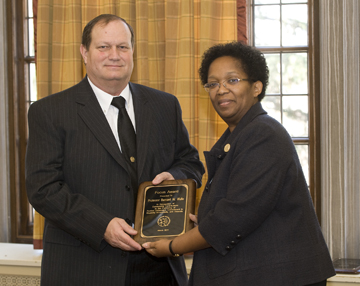Professor's disability employment effort taking off

Alysa Rollock (right), vice president for ethics and compliance, presents the 2011 faculty Focus Award to Bernard Wulle, associate professor of aviation technology. (Purdue University photo/Mark Simons)
Purdue presented four Focus Awards on March 1 for outstanding contributions to furthering the University's commitment to disability accessibility and diversity. Today, Purdue Today is featuring the faculty recipient, Bernard Wulle, associate professor of aviation technology.
Bernie Wulle is building bridges with airplanes and dreams. If he has his way, the aviation industry is going to find out how valuable employing persons with disabilities can be, and in a lot more types of jobs than some people first imagine.
He has taken a major step, bringing the Able Flight scholarship training program to Purdue last summer with two students who use wheelchairs and can pilot a light sport plane. One has realistic hopes to become a commercial pilot. For introducing and conducting the program, Wulle won a 2011 Focus Award, but he isn't through.
"I'd like to make this into a pipeline that gets people ready to work in aviation," he says. "We can expand here, but I want our model to be adopted by other universities, too. And we need for both industry and young people to recognize the possibilities."
Heather Schultz and Chris Spaur were the 2010 trainees, each receiving a month of all-expense-paid training on an Able Flight scholarship.
"Working with the students is a lot of fun," Wulle says. "I especially enjoyed watching other people watch them. There was a lot of doubt and trepidation at first."
A 2011 cadre that could be three or four people is being assembled; the national Able Flight program is hoping to include disabled veterans. In addition, Wulle is working with a British program called Flying Scholarships for the Disabled and may be able to train three or so students at FSD expense. Timing is the issue, Wulle says: "Their selected students will not begin the processes with the TSA [U.S. Transportation Security Administration] until April 17. That's my only concern, dealing with TSA" in time for the June-August six-week program.
From his office in the sole top-floor room in the old part of Niswonger Aviation Technology Building, Wulle can see a big picture including the runway and terminal at Purdue Airport. Elsewhere in his building, Amelia Earhart once counseled students about creating and using career opportunities.
Others are noticing the direction Wulle is taking things. Just days after the Focus Award, the Christopher and Dana Reeve Foundation announced an $8,000 grant to Able Flight to support the 2011 program at Purdue.
Wulle was put in touch with Able Flight's national director, Charles Stites, by a mutual acquaintance who knew of Wulle's background. He has undergraduate and graduate degrees in special education and taught for a time before turning his longtime passion for flying into a career flying commercially. But his teaching degrees helped lead him to his position at Purdue. Now the two parts are combining to connect persons with special needs to careers in aviation.
"If the people this summer are any indication, industry will like what it sees when it starts looking seriously at people with disabilities as job candidates," he says. "They were punctual, disciplined and hard-working."
In January, Schultz and another pilot with a permanent injury, Sean O'Donnell of Villanova University, flew 1,100 miles in winter air on a tour to raise funds for wounded veterans to become pilots. Wulle says, "I'm tickled that they got motivated and went out and helped others."
Spaur is working on obtaining the medical clearance needed for a private pilot license. It may take some time, Wulle says, so money could become a key factor, but if it goes well, Spaur may continue toward a commercial license.
Wulle asked people at one large Midwestern air service company how many of their hundreds of employees have disabilities. Two, they answered. And their main building is ADA-compliant. Now there's conversation about all kinds of jobs.
"The aviation industry needs good and talented people in all areas," Wulle says. "Many of these people have skill sets involving ability to adapt methods to changing circumstances -- economic, regulatory, accident risk and other things -- that the industry faces constantly."
He wants to take the same message to younger students, and he says Able Flight is really "eye candy," an attention grabber so people will hear the larger message: Careers in aviation are available for people with disabilities.
